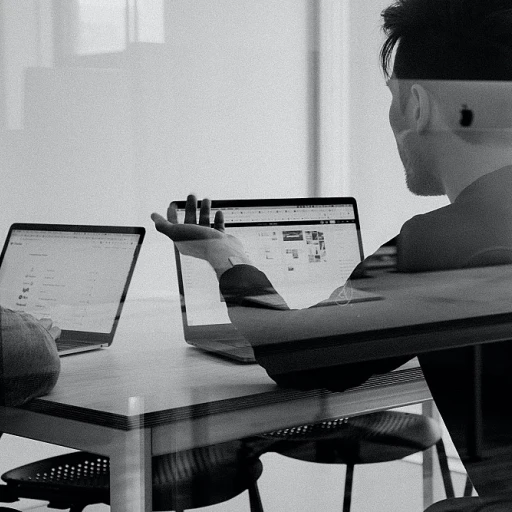
The Evolving Role of a Chief People Officer
Adapting to the Dynamic HR Landscape
The digital transformation of the workplace is reshaping traditional roles in human resources, and the Chief People Officer (CPO) is no exception. As businesses evolve, the CPO’s responsibilities expand beyond conventional HR functions to encompass strategies that foster a conducive work environment and drive organizational growth. With the advent of artificial intelligence, CPOs find themselves at the helm of integrating innovative technologies into the company culture and talent management initiatives.
In today's competitive business landscape, organizations are increasingly recognizing the importance of the CPO role in shaping an adaptive, inclusive, and engaging company culture. People officers are not only tasked with managing employee relations and talent acquisition but also with leveraging data-driven insights to enhance employee experience and performance management. The chief human resources officer is instrumental in fostering an environment where digital tools and human-centric strategies go hand in hand to drive business success.
The transition to an AI-driven HR environment is influencing the way companies approach core functions like talent management and employee engagement. For CPOs, this means developing long-term strategies that integrate AI tools to better manage human resources. By staying abreast of trends and understanding the role of AI in business, people officers can effectively lead and implement changes that benefit both employees and the organization.
The evolving role of a CPO is crucial in navigating the balance between technological advancements and maintaining a strong organizational culture. By embracing leadership initiatives that reflect a commitment to diversity and inclusion, CPOs play a pivotal role in shaping a sustainable work environment.
For more insights on how the role of a CPO is changing in the age of AI, visit this article.
AI Tools Enhancing HR Functions
Revolutionizing HR Functions with AI Tools
Artificial Intelligence has become a transformative force in the realm of human resources, providing Chief People Officers (CPOs) with an arsenal of tools that enhance various HR functions. These tools are not only streamlining processes but are also contributing significantly to better employee engagement, performance management, and talent acquisition. One of the primary ways AI is influencing HR is through the automation of repetitive tasks that previously consumed a significant portion of HR personnel's time. By automating these tasks, businesses can reallocate human resources to more strategic initiatives, fostering a more innovative work environment. This shift in responsibilities helps CPOs focus on enhancing company culture and improving the overall employee experience. AI-Driven Talent Management and Acquisition AI tools have greatly enhanced talent acquisition strategies by enabling more efficient screening and selection processes. Algorithms can sift through large volumes of resumes, quickly identifying candidates whose skills and experience best match specific job descriptions. As a result, CPOs and their teams can focus on engaging with the most promising talent, thereby improving the quality of new hires. Moreover, AI in talent management aids in identifying skill gaps among employees, allowing organizations to implement targeted training programs. This ensures that employees are continually developing, positioning the company for long-term success. To learn more about how AI contributes to achieving internal equity in human resources, consider exploring this AIHR article. Enhancing Employee Engagement Through AI Employee engagement is a critical factor that impacts business success, and AI tools play an essential role in enhancing this facet of HR. By analyzing employee interactions, feedback, and performance data, AI can provide insights into employee sentiment, allowing CPOs to devise strategies that foster a supportive and inclusive workplace culture. Furthermore, AI-powered chatbots are revolutionizing employee relations by offering immediate responses to frequently asked questions, thus enhancing the employee experience. This technology enables HR teams to maintain an open line of communication with employees, addressing their concerns quickly and effectively. In conclusion, the integration of AI tools in HR functions is not just an upgrade; it's a fundamental shift that empowers Chief People Officers to lead their organizations with data-backed strategies, ensuring a dynamic and employee-focused work environment.Data-Driven Decision Making in HR
Empowering HR Through Data Intelligence
In the modern workplace, the role of data-driven decision-making is transforming human resources (HR) departments globally. The Chief People Officer (CPO), a pivotal figure in any organization, increasingly relies on AI-powered insights to make informed decisions regarding talent management and employee engagement. AI tools are revolutionizing how CPOs assess employee performance, implement effective management strategies, and drive organizational culture change.
Data analytics provides valuable insights into employee performance, helping with talent acquisition and retention strategies. By analyzing large sets of data, CPOs can lead initiatives that align with long-term organizational goals and employee development. The integration of AI in decision-making processes enhances the ability to understand complex workforce dynamics, predict turnover rates, and identify gaps in employee experience.
This tech-driven approach allows human resource leaders to forecast trends and adapt management strategies to improve company culture and work environment. By leveraging data, people officers can develop evidence-based management strategies that bolster employee relations and drive diversity inclusion initiatives.
Organizations are increasingly adopting these technologies to gain a competitive edge in the dynamic field of HR. Comparing AI solutions can be a useful approach for CPOs looking to enhance their department's operations. For those interested in exploring AI options, comparing AI solutions offers insights into different tools available in the market.
Ethical Considerations of AI in HR
Addressing the Ethical Landscape with AI in HR
Navigating the world of artificial intelligence within HR management raises significant ethical questions. With AI's growing prominence in the company culture, emphasizing fairness, transparency, and privacy is critical. The role of a chief people officer becomes paramount in these aspects, as they must ensure ethical considerations are at the forefront and integrated into the organization's core values. One of the fundamental ethical concerns is data privacy. AI systems rely heavily on data-driven algorithms to enhance talent management and employee relations, but the volume of data collected can potentially infringe on personal privacy. Balancing the business advantages of AI tools with a respect for individual privacy is an increasingly critical part of a people officer's job description. Another pressing issue is impartiality within AI systems. There's a risk that these systems may inadvertently perpetuate existing biases, thereby impacting diversity and inclusion within the organization. As such, it is crucial for leadership in human resources to collaborate closely with technology teams to develop strategies that ensure these tools are equitable and just. Employee engagement in AI-driven initiatives also necessitates ethical considerations. How AI influences the employee experience, from recruitment to performance management, can significantly impact the organization's work environment. As custodians of the company's culture, officers must champion initiatives that promote trust and transparency. The leadership role of chief people officers in advancing policies that adhere to ethical standards remains crucial as technology evolves. By prioritizing these ethical considerations, CPOs can effectively balance advancing AI within human resource systems while safeguarding their organization's integrity.Training and Development in an AI-Driven HR Environment
Refining Skills and Strengthening Capabilities with AI
In today's rapidly evolving work environment, integrating AI into human resources is reshaping the training and development strategies for employees. The role of the Chief People Officer (CPO) is paramount in driving these initiatives, ensuring employees are equipped with the necessary skills to succeed in the AI-driven business landscape. Organizations are increasingly leveraging AI to enhance employee training programs, leading to more personalized and adaptive learning experiences. These innovative tools allow the CPO to tailor training modules to individual needs, thereby improving engagement and retention.- Data-Driven Training: AI analytics identify skill gaps and suggest customized learning paths, ensuring employees are continually developing relevant skills.
- Continuous Learning Culture: By fostering a workplace culture that values ongoing learning, people officers can create an environment conducive to employee growth and sustained company success.
- Performance Management Enhancements: With AI, performance management is more data-centric, delivering accurate insights into employee progress and areas requiring improvement.













